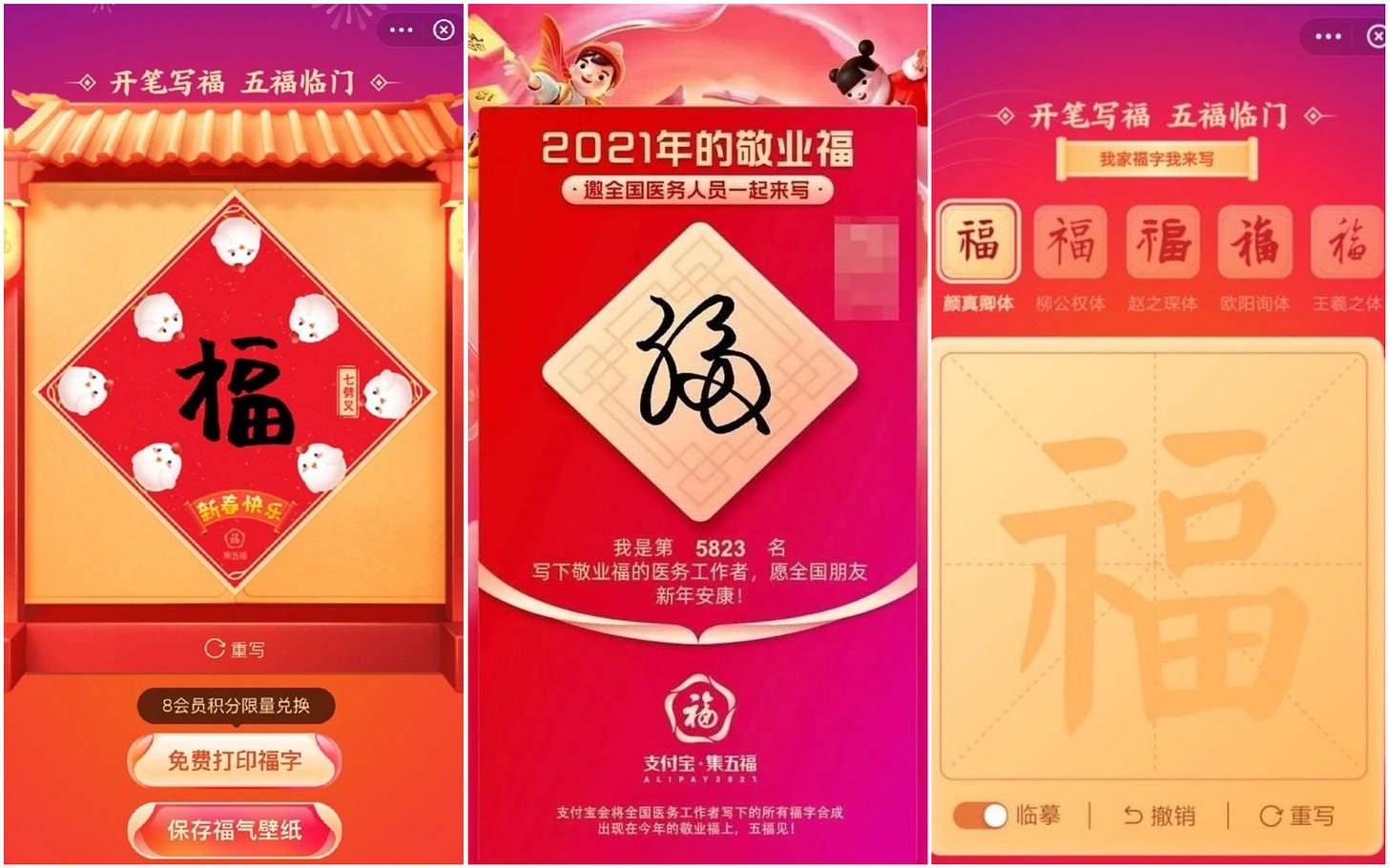Future Tech China: Douyin’s Winning 2021 Playbook
Plus: Short video platforms get smart, Miniso and Bilibili team up, and tech giants get spendy for the Spring Festival.
Published three times per week, the Content Commerce Insider newsletter highlights how brands create content to drive revenue, globally. If you have received our newsletter from a friend or colleague, we hope you will subscribe as well and follow us on LinkedIn and Instagram.
Who can boast the following triple whammy?
A brand new mobile payment service.
Exclusive partnership to sponsor CCTV’s Spring Festival Gala.
All of Gen Z's attention.
That's right. It's the Chinese version of TikTok, the innocuous fun factory your baby nephew and mom are addicted to. But the gloves are coming off for Douyin this year. Here’s what they’ll do to guarantee their ascendancy at home in China over the course of 2021.
1. Closing the Commerce Loop With Payments
In the Chinese market, if you want to compete as an ecosystem or a platform, you must control all transactions. In July 2020, Meituan temporarily canceled the use of Alipay on its platform. When users objected (fervently), Meituan founder Wang Xing pointed out that his company had to cover processing fees for Alipay and rival Tencent’s WeChat Pay. Obviously, the platform bears these costs, not the user. Internet companies in China mostly operate in a zero-sum environment: you either win or lose. So every yuan in transaction fees that goes to Alipay or WeChat Pay is a yuan lost to a competitor.
And thus, on January 20, Douyin Pay was launched, operating with an initial no-fee policy — unlike Alipay and WeChat Pay, which both have fees for withdrawals and transfers by users and third parties. This is very likely to change as Douyin gains market share, but it represents a valuable proposition for users. For any platform-based firm, the payment link is key to the establishment and growth of its internal platform economy. Without the payment element, internet companies remain dependent on the likes of Alipay and WeChat Pay to complete transactions. See, for example, Kuaishou, which doesn't (yet) control the entire commerce loop and remains dependent on Alibaba and Tencent.
Of course, Douyin hasn’t immediately shut out the competition, since both Alipay and WeChat options are still available to its users. So Douyin's upcoming priorities are, first, to get people to sign up for its payments service, and, second, to get vendors on board. The latter will take a lot of time, as Alipay and WeChat Pay have become the standard for both online and offline commerce. So Douyin has a lot of catching up to do. But one thing will definitely help with its user acquisition...
Partnering With CCTV’s Spring Festival Gala
Over the past week or so, Chinese media has been abuzz with rumors that Douyin would take over the exclusive contract for the interactive partnership of CCTV’s Spring Festival Gala, which is viewed by pretty much all of China (no joke, it had an audience of 1.23 billion in 2020) during the eve of the Lunar New Year, functioning as a familiar backdrop during family gatherings for the holiday. Since 2014, one lucky tech company has been named to give away “lucky money” (aka red envelopes/red packets, or hongbao, 红包) to viewers during the hours-long broadcast. The big internet players fight for the right to bestow loads of money for a reason.
In “The Secret to China's Mass Adoption of Tech,” I explained how financial incentives have subsidized China's tech adoption, especially when it comes to payment services. WeChat Pay was the first interactive sponsor of the CCTV gala in 2014, and it had less than 8 million users before the broadcast. But within two days of the show’s airing, WeChat saw some 200 million bank cards added to the WeChat Pay system. The CCTV Spring Festival Gala is a make-or-break moment for new payment providers, such as Douyin Pay. This week, it was officially confirmed that Douyin will take on the sponsorship role, and plans to give away RMB 1.2 billion ($185 million) during the broadcast.
Expanding on the E-commerce Front
Douyin used to allow its primary retail partner, Alibaba’s Taobao, to sell through short videos on its platform. Sellers were able to create videos and directly embed e-commerce links enabling users to purchase products from Taobao. It was a close partnership, and Douyin even set up its e-commerce headquarters just two miles from Taobao’s offices in Hangzhou. But the fairytale came to an end in August 2020, when Douyin announced that it would ban links to Taobao, third-party websites, and promotions from third-party e-commerce platforms, as well as requiring merchants to use its proprietary matching service to find influencers to work with on Douyin. So now the geographic juxtaposition just seems invidious. But it worked.
From January to November 2020, Douyin’s overall e-commerce gross merchandise volume (GMV) saw an 11-fold increase, and, more importantly, GMV for Douyin Stores saw a 44.9x increase. And that’s with Douyin taking a 5% transaction fee on sales (Taobao takes no transaction fees, while Tmall takes anywhere from 0.5-5%). Add transaction fees to the fact that advertising represents the biggest share of Douyin’s revenues, and you’ve got yourself a feast. But Douyin, like all other internet companies, has decided that advertising and transaction fees aren’t enough for its empire, so…
Kickstarting Financial Services
Fintech services are the end-all-be-all for Chinese internet companies. No matter how great profits may be in absolute terms, profit margins still matter. Ant Group’s profit margin is around 30%, whereas Tencent and Alibaba’s hover around 25% to 27%. Meituan, on the other hand, which as a predominantly food-oriented delivery service is more connected to the offline world, just managed to start turning a profit. Fintech offerings such as loans and credit lines significantly increase profit margins. But how likely is it that a short video platform will go down this route? Sure, if YouTube said they'd start giving out loans, it would sound very odd. But in China, it's actually very likely.
Meituan, for example, already has a consumer credit program, as do ride-hailing giant Didi (Dishuidai), social media platform Weibo (Sina Finance), and search engine leader Baidu (Baidu Youqian). It’s become so common that more than 200 companies now hold internet payment licenses. You’ll be hard-pressed to find a Chinese internet company that doesn’t have a payment option. And the ultimate reason why they all believe they’ll at least be moderately successful at fintech is that they believe that the data they gather on their users will allow them to accurately predict financial needs. I’m not sure what my transportation needs or short video preferences have to say about my financial status, but we’ll see.
Separately, Bytedance has also already won four licenses for insurance, securities investment, and online microfinance over the past three years. And yes, Alipay and WeChat Pay both have a massive moat, fueled by Alibaba's Taobao and Tmall and Tencent’s WeChat. Most of that moat is based on how entrenched Alipay and WeChat Pay are among third-party vendors. It's the standard. For now. But that could soon change.
5. Evading Major Regulatory Pitfalls
As Alipay's financial empire-building is coming to a screeching regulatory halt, Douyin Pay is trying to swoop in. China's new regulations on "non-bank payment institutions,” released earlier this month, will help, stating, among other things, that a single payment provider cannot control more than half the market, and two providers can't have a combined market share of more than 75%.
With Ant Group boasting a 55.6% market share and Tencent at 38.8%, they'll clearly find themselves in the crosshairs. Time will tell what happens to these two giants. Tick Tock.
- by Tanya Van Gastel
Mentioned in today’s newsletter: Airbnb, Alibaba, Bilibili, Bytedance, Didi, Disney, Douyin, Hey Tea, KFC, Kuaishou, MAC Cosmetics, Netease, Marvel, Meituan, Miniso, Muji, Pinduoduo, Sesame Street, Taobao, Xigua Video.
Key Takeaways From the Webinar “How Collaborations Are Defining Experiences in China”
KFC and insect repellent. MAC lipsticks and Honor of Kings. Airbnb and Hey Tea. Why are these unconventional pairings so successful?
While these brands may seem mismatched, it’s precisely this strangeness that helps them stand out in China’s oversaturated market. The novelty and limited-time appeal of these partnerships lure young consumers not only into trying new products, but also posting about them on social media, helping companies further expand their reach.
On January 26, the Jing Group teamed up with cross-cultural agency TONG to discuss why these brand collaborations continue to resonate in China. The event, “Tracking the Trends for 2021: How Collaborations Are Redefining Experiences in China,” was moderated by Enrique Menendez, editor-in-chief of Jing Daily. Panelists included Adam Knight, co-founder of TONG; Sky Canaves, editorial director of Content Commerce Insider; Christina You, director of development at UCCA Center for Contemporary Arts in Beijing; Ian Lu, founder of Notitle Ltd. Co.; and Feng Chen Wang, founder of the eponymous London-based menswear label.
During the hour-long webinar, panelists pulled back the curtain on what creative crossovers entail, from the risks and rewards to what consumers really want. This week, CCI sister publication Jing Daily details five things brands should know before launching a collaboration in China.
Read the full story at Jing Daily.
CCI Take: Knowledge-Based Video Content Is the Latest Battleground for Chinese Tech
by Avery Booker
Brands worldwide are already well aware of China’s short video boom of the last few years, which has powered the growth of hugely popular platforms such as Bytedance’s Douyin (TikTok’s sibling for the Chinese market) and Xigua Video, Kuaishou, Bilibili, and many others. But the growth of these platforms — many of which, it must be pointed out, are branching into longer-form content and e-commerce to keep users engaged (and spending) — has been accompanied by rising demand for knowledge-based content rather than simply entertainment.
While brands invest more in brand-funded reality shows, documentaries, short films, and even feature-length movies, a growing number of academic institutions, teachers, and even students themselves are finding short video and livestreaming content to be an ideal educational avenue. Bilibili in particular saw its fortunes soar last year as the “cloud living” trend took over in China and its core Gen Z audience (along with older viewers interested in learning a new skill or subject) tuned into educational content on their smartphones.
As CCI previously noted, there are three content pillars where Bilibili shines: ACG (Anime, Comics and Games) lifestyle, and education — all of which lend themselves well to longer-form content that can retain viewer attention for hours at a time. After schools were closed last year in China due to the coronavirus outbreak, Bilibili became an official course provider in Shanghai as schools reopened in virtual mode in March 2020. The platform also started streaming courses from Tsinghua and Peking University, China's most prestigious institutions of higher education.
In addition to courses, livestreamed "study sessions" also became popular during this period, with more than 20 million Bilibili users joining to watch virtual companions engaged in course work while they studied alongside them, often using the hashtag #StudyWithMe.
Looking to get in on the growth of educational content in China, last week Netease announced a new knowledge-based short video platform called Netease Knowledge Highway (网易知识公路), with the company planning to plans to expand video on other NetEase properties such as Netease News, Netease Cloud Music, fanfic platform Lofter, and online education subsidiary Netease Youdao.
Read the full story on Content Commerce Insider.
Brand Collab Pick: Miniso x Bilibili
The Japanese-influenced, dollar-store-style retail chain Miniso has ridden the demand for trendy and inexpensive lifestyle products to a $600 million-plus IPO in New York last fall while rapidly expanding its global footprint (4,200 outlets and counting) and spinning off into toy stores as well.
MIniso has relied on content and collaborations to set its brand apart, moving it beyond the minimalist “no-brand brand” approach taken by the likes of Muji (often cited as an inspiration for Miniso), to appeal to young consumers with co-branded goods with the sources of beloved IP from Marvel, Disney, and Sesame Street.
Its latest collaboration with Bilibili follows this approach to elevate the video streamer’s own brand mascots into IP figures. Two new collections are based on the platform’s signature IP characters: the Bilibili TV-head mascot and two anime-style “Bili Girls” (numbers 22 and 33, chosen by users to represent the platform). The collaboration is the second between the two, with a previous partnership last year taking a more traditional IP route, featuring the main characters from Bilibili’s animated adaptation of the web novel series "Heaven Official's Blessing” (天官赐福).
The new series will easily appeal to Bilibili’s highly engaged Gen Z core audience (80% of its users are 25 and under) with collectible daily use items such as headphone cases, eye masks, bucket hats, and shopping totes. The product launch was held at a Shanghai Miniso store decorated with a Bilibili theme, drawing fans of the platform to both shop and snap selfies with Bilibili cosplayers.
News From China
Getting spendy for the Spring Festival: Douyin has been confirmed as the exclusive interactive partner for the world’s most-watched TV program, the CCTV Spring Festival Gala, and will give away a record (for the broadcast) RMB 1.2 billion ($185 million) to viewers via virtual red envelopes during the show.
Social commerce platform Pinduoduo had been announced as this year’s gala sponsor back in September, but was forced to withdraw as a scandal unfolded over the past month over the deaths of two employees and allegations of its culture of overwork.
Alipay’s popular Wufu campaign is back for a fifth year, encouraging users of the app to collect five digital cards to get small amounts of money. Last year, Alipay gave away a total of RMB 500 million ($77 million), although that only amounted to RMB 1.6 for each of the 318 million participants. Alipay’s Wufu has become more of a fun social holiday tradition rather than a way to get real money, and this year the fintech giant introduced more entertaining elements, such as inviting users to write the character for “fu” (福, meaning luck, fortune, and blessings) in one of five calligraphy styles and decorate the image with virtual stickers, offering free delivery of printouts of the finished product offered to the first 500,000 who request them each day. Alipay also partnered with Netease Cloud Music to release a Wufu theme song performed by Zhou Shen and produced a humorous short film starring two popular actors that acknowledges the fact of separation that many families will face during this year’s holiday.
It looks like Gen Z’s favorite video platform Bilibili is also getting into the cash giveaway game, albeit with a creative twist. Chinese media report that the company has filed a patent for “bullet comment hongbao,” which would allow users to send virtual red envelopes via the platform’s distinctive on-screen commenting feature. While no launch date has been mentioned, and it’s unclear whether the new feature will debut in time for this year’s Lunar New Year, it sounds like it would offer an innovative way for brands to get attention and interact with the Bilibili audience.
The increasing number of Covid-19 cases in various parts of the country will keep more people at home during the long holiday, and we can expect to see an uptick on online spending as a result. In Shanghai, which has seen a trickle of new infections reported over the past week, local officials launched a 30-day online shopping festival that will run until February 18, with participation by nearly 50,000 offline merchants and 20-plus e-commerce operators. Promotions will include coupons and vouchers totalling RMB 6 billion ($925 million) in value, and 5,000 livestreaming broadcasts to boost sales.
A step in the global direction for China’s idol competition shows: Is it only a matter of time before C-pop gets its moment in the international spotlight to rival K-pop’s?
Some of China’s most popular idols, such as Lu Han, Jackson Wang, and Lay Zhang, got their start as members of Korean boy bands, while K-pop stars like Lisa of Blackpink (who hails from Thailand) command a huge fan base in China and the rest of the world.
Now, Chinese video streaming giants Tencent Video and Youku are taking a more pan-Asian approach to finding the next big thing. The next edition of Tencent Video’s successful “Produce Camp” (创造营) franchise (which debuted in 2018) will double its output by creating two distinct seven-member boy bands from a pool of 100 hopefuls. One group will be all-Chinese, while the second will include members from other (predominantly Asian) countries. Rival Youku’s new program “Asia Super Young” (亚洲超星团), will see nearly 300 contestants from China and across the region show off their skills in singing, rap, and street dance as they vie for one of seven spots in a new boy-band.
The bet is that they can discover and promote new talent that will appeal both to Chinese audiences as well as those overseas and serve as potential brand ambassadors, while also boosting the profile of their video offerings in competitive new markets in the region.
News in English
Bytedance more than doubled its revenues in 2020 to $37 billion, despite being banned in India and threatened with a similar fate in the United States. The Information
The hugely popular Chinese DTC fast-fashion brand Shein has reportedly emerged as a top contender to buy the U.K.-based Acadia Group, parent of Topshop, Miss Selfridge, and Burton, among others. MSN
More on the TikTok of fashion: the first in a three-part series on Shein’s backstory and its rapid rise into the hearts of global Gen Z. KrAsia
Influencer and reality TV star Grace Chow launched a digitally native beauty brand that sold out on day one of its launch. Glossy
“Crazy Rich Asians” producer Peter Luo’s Starlight Media has drawn major Hollywood players to join its diversity program to support emerging and underrepresented filmmakers. Variety
Covid concerns are casting uncertainty over the prospects for China’s box office during the upcoming Lunar New Year holiday, typically the market’s peak moviegoing period. CGTN
With China’s film industry in flux, more movie stars have been taking on roles for the smaller screens. SCMP
The Italian luxury menswear label Canali has partnered with emerging Chinese brand 8ON8 on a capsule collection, the first in a planned series of collaborations with up-and-coming designers from around the world. WWD
High-end watch and jewelry brands such as De Beers, Omega, and Buccelatti are vying for prime retail space in lower-tier cities such as Chengdu to tap growing wealth among consumers across the country. SCMP
McDonald’s seeks to compete against Starbucks in China with a major expansion of its McCafe brand, and recently tapped the nostalgic content of a long-running children’s TV show in its latest campaign. Dao Insights
Cancel culture hits global brands: There has been a steep increase in the incidence of public backlash against international brands for perceived offenses against China — of 120 cases recorded since 2009, there were as many as 40 in 2019 alone. The Diplomat
We’ve Got China Covered
China Film Insider: A Show About Poverty Alleviation Is Getting Historically High Reviews
Jing Daily: Can Luxury Reach Gen Z With Anime?
Jing Culture & Commerce: The Video Game Intent on Redefining the Art Audience








